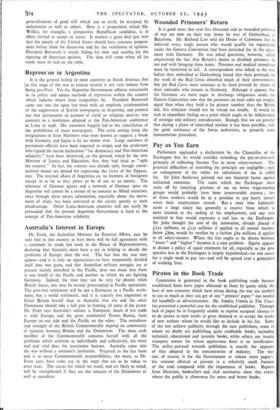Pay as You Earn
Parliament applauded a declaration by the Chancellor of the Exchequer that be would consider extending the pay-as-you-earn principle of collecting Income Tax to more salary-earners. . The practical difficulties of extending the principle are negligible ; only an enlargement of the tables for calculation of tax is called for. Sir John Anderson pointed out one financial factor against unlimited extension. The sums which the Exchequer must write off by remitting portions of tax on lower wage-earning groups would probably have been irrecoverable anyway ; few of those workers would be in a position to pay heavy arrears when their employment ceased. But a man who habitually earns a large salary has generally a reserve from which to meet taxation at the ending of his employment, and any sum remitted to him would represent a real loss to the Exchequer. Sir John thought the cost of the innovation, already placed at £125 millions, or £132 millions if applied to all annual incomes below L600, would be swollen by a further £6o millions if applied to all salary-earners. Where the line ought to be drawn between " lower " and " higher " incomes is a nice problem. Equity appears to dictate a policy of equal treatment for all, especially as the pro- spective loss to the Exchequer is largely hypothetical—no one ceases for a single week to pay tax—and will be spread over a generation of working lives.


























 Previous page
Previous page